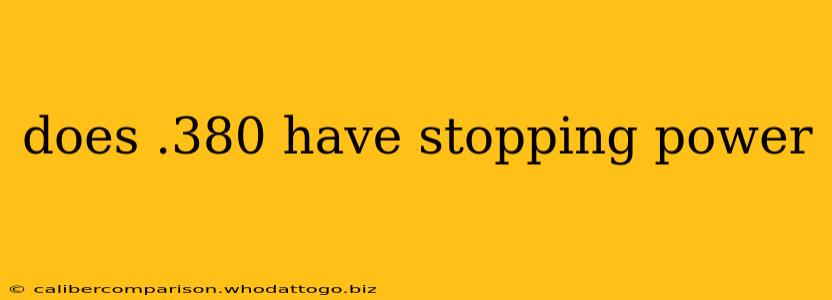The question of whether the .380 ACP (Automatic Colt Pistol) cartridge has sufficient "stopping power" is complex and doesn't have a simple yes or no answer. Stopping power, in the context of firearms, refers to a cartridge's ability to immediately incapacitate a target. It's a multifaceted issue influenced by several factors beyond just the caliber itself. Let's delve into the details.
Understanding the Limitations of "Stopping Power"
The term "stopping power" is often misunderstood. It's not a purely quantifiable metric like bullet velocity or energy. While a larger caliber generally delivers more energy, a bullet's effectiveness depends on a combination of factors including:
-
Shot Placement: The most crucial factor. A well-placed shot to a vital organ, regardless of caliber, is far more likely to incapacitate a target than multiple shots to less critical areas. Even a small-caliber round can be lethal with precise accuracy.
-
Bullet Expansion: A bullet that expands (or mushrooms) upon impact transfers more energy to the target, increasing the likelihood of incapacitation. Different .380 ACP ammunition types vary significantly in their expansion characteristics.
-
Bullet Construction: The materials and design of the bullet significantly impact its performance. Hollow-point bullets, for instance, are designed to expand on impact, while full metal jacket bullets tend to penetrate more deeply.
-
Target Factors: The size, weight, and physical condition of the target all play a role in how they react to being shot.
.380 ACP: Examining the Facts
The .380 ACP is a relatively small caliber, delivering less energy than larger cartridges like 9mm or .45 ACP. However, modern .380 ACP ammunition, particularly hollow-point rounds, is designed to maximize its effectiveness within its limitations. These rounds are often engineered to expand reliably, creating larger wound cavities.
Advantages of the .380 ACP:
- Concealability: Its small size makes it ideal for concealed carry, making it a popular choice for personal defense.
- Recoil Management: The lower recoil makes it easier to shoot accurately, especially for individuals with less experience.
- Availability: .380 ACP ammunition is widely available and relatively affordable.
Disadvantages of the .380 ACP:
- Lower Energy Transfer: Compared to larger calibers, it generally delivers less kinetic energy upon impact.
- Penetration: While penetration can be advantageous in some situations, in others, excessive penetration can be a disadvantage. The penetration capabilities of a .380 ACP vary significantly based on the bullet type.
- Barrier Penetration: Its smaller size makes it less likely to penetrate barriers effectively compared to larger rounds.
Conclusion: Context Matters
While the .380 ACP might not offer the same stopping power as larger calibers, its effectiveness isn't solely determined by its caliber. Modern ammunition design and accurate shot placement play critical roles. Therefore, it's inaccurate to simply declare the .380 ACP as having or lacking "stopping power" without considering the context. It's a viable option for self-defense, particularly when concealed carry is prioritized, but users should understand its limitations and the crucial importance of proper training and accurate shot placement. Choosing the right firearm and ammunition is a highly personal decision that should take individual needs, training, and local regulations into account. Always consult with a firearms expert and receive proper training before carrying any firearm.

